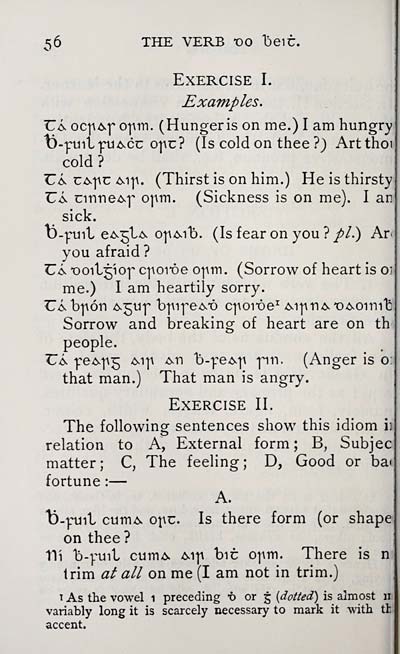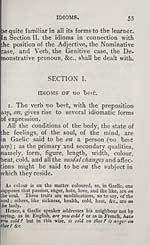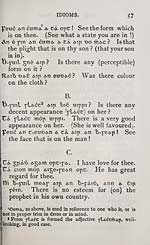Download files
Complete book:
Individual page:
Thumbnail gallery: Grid view | List view

5 6 THE VERB -oo beiú.
Exercise I.
Examples.
T7Á ocp&f ofirn. (Hunger is on me.) I am hungry
fó-pnt'pti&cc ojac? (Is cold on thee ?) Artthoi
cold?
T,k u&fic m]\. (Thirst is on him.) He is thirsty
UÁ umne^vp opm. (Sickness is on me). I an
sick,
fa-pul e&jt^ ojA&ib. (Is fear on you? pi.) Ar<
you afraid ?
UÁ -ooitgio-p qio-me o-prn. (Sorrow of heart is O)
me.) I am heartily sorry.
UÁbjión ^ju-p bpi-pe^'ó epoTOe 1 ,Mfin& , o.cvOini'b
Sorrow and breaking of heart are on th
people.
TTÁ fe&-p5 M]\ ^n b--pe.<yp pn. (Anger is o:
that man.) That man is angry.
Exercise II.
The following sentences show this idiom ii
relation to A, External form ; B, Subjec
matter; C, The feeling; D, Good or ba<
fortune : —
A.
fa-pnt curn-c* ope. Is there form (or shape-
on thee?
Hi b-piit cum^ M]\ biú o|Atn. There is n
trim at all on me (I am not in trim.)
i As the vowel 1 preceding -6 or £ {dotted) is almost n
variably long it is scarcely necessary to mark it with tr.
accent.
Exercise I.
Examples.
T7Á ocp&f ofirn. (Hunger is on me.) I am hungry
fó-pnt'pti&cc ojac? (Is cold on thee ?) Artthoi
cold?
T,k u&fic m]\. (Thirst is on him.) He is thirsty
UÁ umne^vp opm. (Sickness is on me). I an
sick,
fa-pul e&jt^ ojA&ib. (Is fear on you? pi.) Ar<
you afraid ?
UÁ -ooitgio-p qio-me o-prn. (Sorrow of heart is O)
me.) I am heartily sorry.
UÁbjión ^ju-p bpi-pe^'ó epoTOe 1 ,Mfin& , o.cvOini'b
Sorrow and breaking of heart are on th
people.
TTÁ fe&-p5 M]\ ^n b--pe.<yp pn. (Anger is o:
that man.) That man is angry.
Exercise II.
The following sentences show this idiom ii
relation to A, External form ; B, Subjec
matter; C, The feeling; D, Good or ba<
fortune : —
A.
fa-pnt curn-c* ope. Is there form (or shape-
on thee?
Hi b-piit cum^ M]\ biú o|Atn. There is n
trim at all on me (I am not in trim.)
i As the vowel 1 preceding -6 or £ {dotted) is almost n
variably long it is scarcely necessary to mark it with tr.
accent.
Set display mode to: Large image | Transcription
Images and transcriptions on this page, including medium image downloads, may be used under the Creative Commons Attribution 4.0 International Licence unless otherwise stated. ![]()
| Early Gaelic Book Collections > Blair Collection > Treas leabhar Gaedhilge > (62) |
|---|
| Permanent URL | https://digital.nls.uk/82322130 |
|---|
| Description | A selection of books from a collection of more than 500 titles, mostly on religious and literary topics. Also includes some material dealing with other Celtic languages and societies. Collection created towards the end of the 19th century by Lady Evelyn Stewart Murray. |
|---|
| Description | Selected items from five 'Special and Named Printed Collections'. Includes books in Gaelic and other Celtic languages, works about the Gaels, their languages, literature, culture and history. |
|---|

